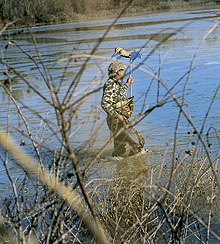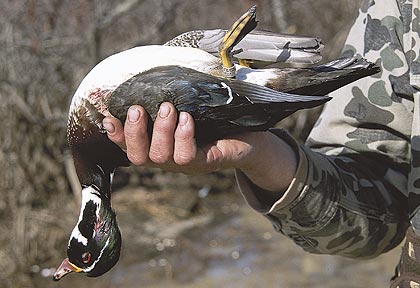It's quite possible that this small slice of Tennessee offers the most ducks in the southeastern United States.
By Jon Wongrey
 Lynn Floyd setting up a spinning-wing decoy. |
Gather near while I tell you this story. But first you must know the lay of the land and its people.
About two hours east of Memphis--maybe a hair's bit more--sits the siesta town of Camden, Tennessee. It's a village surrounded by rolling hills, valleys, ponds, creeks and swamps. There is also a 161,300-acre source of water with a shoreline of some 2,100 miles, once the largest man-made lake in the world, or so I've been told. Its name? Kentucky Lake.
Each year, when every nook, cranny and crevice to the north has been fettered in ice or packed with snow, the Mississippi Flyway sends down its ducks. This is the time to hunt the Lake. And it was such a time when I first hunted the Lake with Lynn Floyd--a man with happy but discerning eyes, a tall, thick, wide-beamed man whose passion to hunt and shoot ducks matches his willingness to render assistance to his neighbor. Lynn Floyd is a waterfowler who knows the scent and the sound of ducks on the move.
To further anchor this story, I must turn back the clock to the early 1990s when I met Lynn while hunting the Bear Tail Duck Club near Coldwater, Tennessee. Ricky French was the club's proprietor and I went there to shoot mallards with Ricky and Lynn in a large flooded cornfield. Yet even as we shot into continuous droves of cup-winged mallards swarming into the decoys surrounding our two-story blind, I noticed large numbers of mallards working the timber not 400 yards to the front of us. The scene reminded me of where I grew up duck hunting, South Carolina's Santee-Cooper Lakes of Marion and Moultrie counties in the mid-1950s and early '60s.
 Lynn Floyd hails a flock of mallards from his family's blind. |
This 171,400-acre impoundment, flooded in the early 1940s, was the terminal port for Atlantic Flyway mallards. And so it was with warm memories that I watched the large flocks of swirling, colorful mallards spiral down through the tall trees.
The shooting was good and during a lull I followed Lynn downstairs into the kitchen area of the blind for a cup of coffee. "I noticed the way you were lookin' at those mallards hittin' the woods," Lynn said to me in his rolling Tennessee accent.
I told him of my fondness for shooting mallards in timber during my coming-up years.
"You know," he said, "I live in Camden, Tennessee, near Kentucky Lake, and I also have some swamp land that I can hunt like where you grew up. If you ever care to come hunt with me, then by all means give me a call."
"Pretty good, huh?" I asked.
"We do okay on the lake and in the swamp. It's like everywhere else, some days you're the pigeon and some days you're the statue," he said, grinning through his beard.
 Belle keeps an eye on a group of high-flying pintails. |
Two years passed with no further communication between us. Then one cold January night, I received a call from Lynn. He said that northeastern Arkansas was locked tight in ice and the ducks had "jumped" the Mississippi River and were now in his corner of the world. "The ducks are on Kentucky Lake and in the swamp," he said happily.
I left early the next morning with Belle, my black Lab, riding shotgun. Before the sun crested the eastern horizon we were through the Blue Ridge Mountains and heading west on I-40. Lynn's comment of "More pintails than I can remember!" kept ringing in my ears.
But I did not know that while I'd slept that night after Lynn's call, a muscular winter storm had manhandled western Tennessee, and the land was frozen hard. By mid-afternoon I pulled into Camden, Tennessee, and called Lynn from a gas station's public phone. Thirty minutes later I followed his pickup truck up Rocky Ridge Road to an old farmhouse on a hill.
 This wood duck is one of hundreds banded each year on Tennessee's Kentucky Lake. |
Belle moved quickly from the car and off to the side of the house and down the hill to tend to her business. As we stood in Lynn's backyard watching her, Lynn said, "Jon, I was wantin' to get you in the swamp for at least one time before we move on to the lake, knowing how you like to shoot ducks in timber. But this weather may have 'jumped' the ducks. In fact, she's probably already done iced-up. If not, she'll for sure be an iceberg by mornin'. But we'll give it a try." And he said it in a most self-reproachful way.
"What about the lake?" I asked.
"More than likely she'll also be frozen stem to stern."
"In other words, some days you're the pigeon and some days you're the statue," I said.
He smiled. "Now let's get you settled in the house," he said. "Mama sent over a pot of chicken an' dumplings, cornbread an' a peach cobbler pie. We're goin' to eat well even if we don't kill any ducks." The temperature continued to drop throughout the evening.
I awakened early the next morning to the smell of thick-cut slabs of bacon frying in a cast iron skillet and the scent of biscuits rising in the oven. I fed Belle and let her outside while Lynn and I ate breakfast. Then we gathered our gear and joined Belle under a bright thumbnail moon. We looked up, hoping to spot moving ducks in its light, but there were none.
"It's a mistake to go down to the swamp but we'll take a look anyway," Lynn said.
The swamp was thick with ice, just as Lynn said it would be. "Guess we'll have to try the lake," he said. "But more than likely it'll be frozen tight. So don't get your hopes too high."
From the public boat ram
p, Lynn's truck lights bounced off the lake's frozen water and we witnessed a spectacle. Maybe it was the truck's lights or maybe it was the shine from the moon, but there was a dancing glow like the aurora borealis. Then, just as suddenly, it was gone. I'd once seen the same lights while duck hunting on Canada's James Bay.
"Still want to give it a try?" Lynn asked.
 Lynn Floyd with two future duck dogs. |
"Might as well," I answered.
"Well, we've got deep open water at the ramp so maybe somehow we can break our way through," he said.
The outboard roared and Lynn opened the throttle. The squared-bowed jon boat lurched and jumped and came down hard on the ice. The ice cracked and splintered and broke into shards as the boat slowly inched forward. The opened passageway quickly refroze behind us.
After a few minutes Lynn shut down the whining motor and stood. Lynn's family's off-the water-blind was ahead.
"You won't believe this, Jon," he said, "but there's no ice around the blind for a good 25-yard perimeter. Now don't that beat all!"
The rest of the lake, for what we could see, was iced in. But we had open water for decoying ducks.
The gear and Belle were loaded into the blind, and after the decoys had been set, Lynn lit the charcoal grill for heat and to later cook our midday lunch of grilled pork chops and canned beans.
There were no birds moving yet, so we drank coffee while Lynn told me about two of his uncles, Uncle Grady and Uncle Roy.
"Uncle Grady lived in Sharon, Tennessee, on the Obion River in a house built on stilts, and he eventually ran the old Davy Crockett Club. Uncle Grady called with his mouth until he came down with the arthritis. Then he started usin' a manufactured call. Some of the decoys we're usin' once belonged to him. No tellin' how old they are. He gave 'em to me when he got too old to hunt.
| DUCKS APLENTY IN WEST TENNESSEE |
|---|
I've heard that West Tennessee winters more ducks than Arkansas€¦it's just that Arkansas has better public relations, so it attracts more duck hunters. Whether or not this is true, it is never easy to probe a strange environment on a first-time hunt, no matter how fruitful the area.
It's usually more productive to hire a guide, and Kentucky Lake is no different. Late season in the Kentucky Lake-Camden area is usually better, but it is all up to the weather. The swamps around Camden hold many ducks but gaining access, since most of the swamps are privately owned, can be difficult.
The Tennessee Wildlife Resource Agency has a number of waterfowl management lands near Camden that are open to the public. You can monitor statistics by phone as to numbers of ducks and their movements. These same birds also use the Lake.
More wood ducks are raised on and around the Lake and the nearby swamps than in any of the other southeastern states--so many woodies, in fact, that the state of Tennessee has a special statewide five-day season in September that usually opens around the 15th. The limit is two birds per day. The teal season (with a daily limit of four) is also open during the wood duck shoot.
Early wood duck gunners should be on the watch for cottonmouths on the Lake and should be especially careful in the swamps if using a retriever.
For more information on waterfowl hunting at Kentucky Lake and the refuge management lands around Camden, write Dan Faqua, West-Tennessee, Region I, 200 Lowell Thomas Dr. Jackson, Tennessee, 38301; (800) 732-3928.
Lynn Floyd does some guiding. If interested, contact him at 4265 Liberty Rocky Rd. Camden, Tennessee, 38320; (731) 586 1791. |
"Now, Uncle Roy had his own way of callin' ducks. He called them real fast an' raspy with an old double-reed Yentzan. He also chewed tobacco. The call's insert was green an' moldy from years of tobacco drool. I doubt if he ever cleaned it."
Lynn started to say something else, but he was cut short by the sound of ducks' wings. And there were many ducks that morning, mostly mallards, but there were also pintails on slender wings rushing to the decoys...decoys that Uncle Grady's eyes once fell upon. It was, in fact, a morning of ducks cascading into the only open water.
We kept Belle busy.






